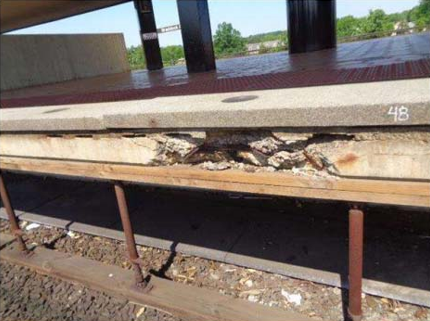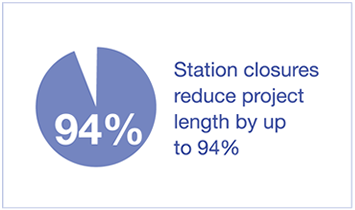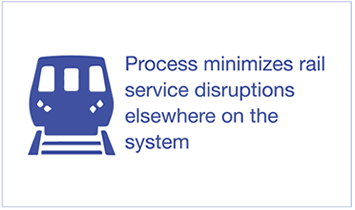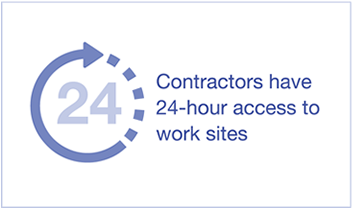 This summer, Metro will shut down all six stations south of DCA. This work is the result of dedicated funding I supported in the 2019 budget. Metro will be providing shuttle bus services. Please find information below from Metro, VDOT, and the Washington Area Bicycling Association about transportation alternatives including bicycle and bus services.
This summer, Metro will shut down all six stations south of DCA. This work is the result of dedicated funding I supported in the 2019 budget. Metro will be providing shuttle bus services. Please find information below from Metro, VDOT, and the Washington Area Bicycling Association about transportation alternatives including bicycle and bus services.
2019 Platform Improvement Project Activities
Metro's contractor will work concurrently at all six stations south of National Airport in summer 2019 to expedite construction and ensure the stations are ready to reopen for customers after September 8.
Based on the contract, one side of the platform at Van Dorn St Station may remain under construction through October 4, requiring single tracking after September 8. In addition, one side of the platform may remain under construction at Huntington and Franconia-Springfield stations through early December; however, service impacts can be minimized at these end-of-the-line stations. Metro’s contract includes incentives for additional work completed by September 8, so any service impacts post-shutdown will be determined as work progresses at each station.
The Metro system has 45 outdoor rail stations constructed with concrete platforms. The affected platforms were opened in 1983 to safely accommodate customers waiting for trains and boarding Metro railcars. Over the years, many of the platforms have begun to deteriorate due to routine wear and tear combined with exposure to weather and de-icing agents. An example of the deterioration at King St. station is pictured to the right.
Shuttle Services
For riders heading to or from the Pentagon or destined for points north like Rosslyn or the District, three express shuttle buses are planned. and two free local routes are planned.
To accommodate additional bus traffic, VDOT will open the shoulders of I-495 as a bus-only travel lane on the Outer Loop (heading east) between the Eisenhower Avenue and Telegraph Road ramps.
The temporary bus-on-shoulder lane will help shuttles and other buses get to exits more quickly. On weekdays from 3 p.m.-8 p.m., the shoulder will be available for Metro and DASH buses only. Although it will serve as a bus-only travel lane, it will continue to be an emergency pull-off location for all vehicles.
VDOT also announced changes at the Huntington Metro station. The right turn lane of eastbound Huntington Avenue between Metroview Parkway and Fenwick Drive will accommodate four temporary bus bays. Metroview Parkway, which is usually open to traffic going to the Huntington North Kiss-and-Ride, will be closed to all traffic but buses.
• Change Washington Street high occupancy vehicle (HOV) lanes from HOV 2 to HOV 3.
• Extend northbound Washington Street HOV lane hours from 7AM- 9AM to 6AM-10AM.
• Extend southbound Washington Street HOV lane hours from 4PM- 6PM to 3PM-7PM.
• Change East and West Abingdon Drive high occupancy vehicle (HOV) lanes from HOV 2 to HOV 3.
• Extend northbound East Abingdon Drive HOV lane hours from 7AM- 9AM to 6AM-10AM
• Extend southbound West Abingdon Drive HOV lane hours from 4PM- 6PM to 3PM-7PM.
Changes to HOV lanes in Alexandria
The City of Alexandria recently made changes to their HOV lanes on Washington Street (George Washington Parkway). Take note and be aware of increased enforcement:• Change Washington Street high occupancy vehicle (HOV) lanes from HOV 2 to HOV 3.
• Extend northbound Washington Street HOV lane hours from 7AM- 9AM to 6AM-10AM.
• Extend southbound Washington Street HOV lane hours from 4PM- 6PM to 3PM-7PM.
• Change East and West Abingdon Drive high occupancy vehicle (HOV) lanes from HOV 2 to HOV 3.
• Extend northbound East Abingdon Drive HOV lane hours from 7AM- 9AM to 6AM-10AM
• Extend southbound West Abingdon Drive HOV lane hours from 4PM- 6PM to 3PM-7PM.
Biking during the Metro Shutdown
Commuters may elect to bike during the shutdown to avoid increased traffic. According to the Washington Area Bicycling Association, the City of Alexandria will be posting bike routes from popular Metro stations in the city.The Alexandria Bicycle and Pedestrian Advisory Committee has a Bike Mentor program for people looking for a coach. The mentor will help guide new commuters and even make sure your bike is ready to ride -- Learn more and sign up here: https://alexandriabpac.
WABA is hosting rides and classes in Alexandria to help familiarize commuters with bike paths in the area. All are posted here: https://www.waba.org/
Construction Strategy Designed to Minimize Impact
After extensive internal planning and consultation with construction experts, Metro developed a strategy that reduces the length of the project by up to 94%. Instead of overnight work or single tracking and weekend outages that stretch on for years, Metro will fully close stations, allowing contractors to have 24-hour access to the work sites instead of limited, sporadic hours. When platforms are rebuilt, the tracks must be taken out of service to allow for demolition of existing structures, access to the construction areas, and concrete pouring. By temporarily closing these stations while construction is underway, Metro can ensure safety for riders and construction staff and greatly reduce the project duration and cost. Additionally, this strategy minimizes rail service disruptions elsewhere on the system.
 |  |
 |  |
Funding that Makes this Project Possible
Metro is investing in system safety, reliability and the region's economy through its 10-year, $15 billion capital program. Virginia was the first of three partner jurisdictions to come forward and fully fund the Metro capital program.
For the first time in Metro's history, the capital program is bolstered by dedicated funding from Maryland, Virginia, and the District of Columbia. The capital program will improve the customer experience and keep the region's infrastructure in a state of good repair by investing in new railcars and buses, improving stations and platforms, upgrading fire-suppression and emergency response systems, replacing and repairing tracks, tunnels, bridges, signals, and communications systems, rebuilding decades-old bus garages and providing modern customer amenities such as passenger information systems. In spending local taxpayer dollars for capital projects, Metro is seeking to reinvest in our hometown economy, creating jobs and encouraging participation from disadvantaged, minority-owned, and small businesses in the region.
For the first time in Metro's history, the capital program is bolstered by dedicated funding from Maryland, Virginia, and the District of Columbia. The capital program will improve the customer experience and keep the region's infrastructure in a state of good repair by investing in new railcars and buses, improving stations and platforms, upgrading fire-suppression and emergency response systems, replacing and repairing tracks, tunnels, bridges, signals, and communications systems, rebuilding decades-old bus garages and providing modern customer amenities such as passenger information systems. In spending local taxpayer dollars for capital projects, Metro is seeking to reinvest in our hometown economy, creating jobs and encouraging participation from disadvantaged, minority-owned, and small businesses in the region.
No comments:
Post a Comment